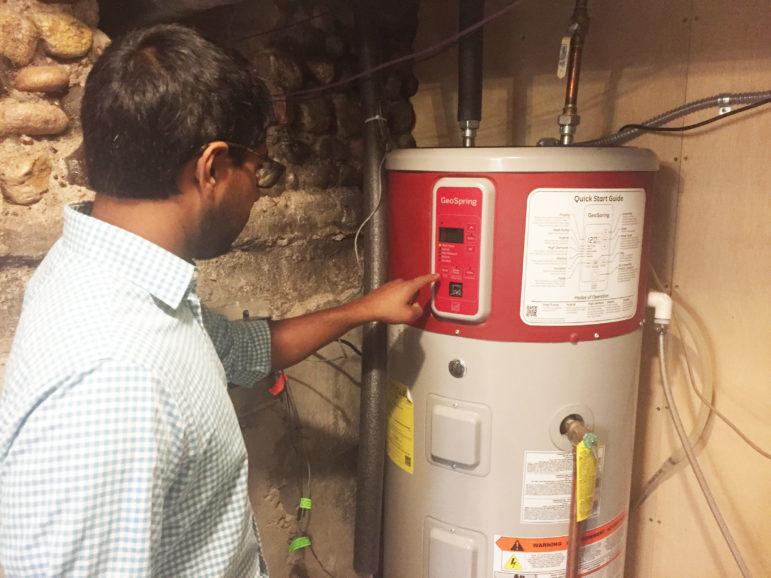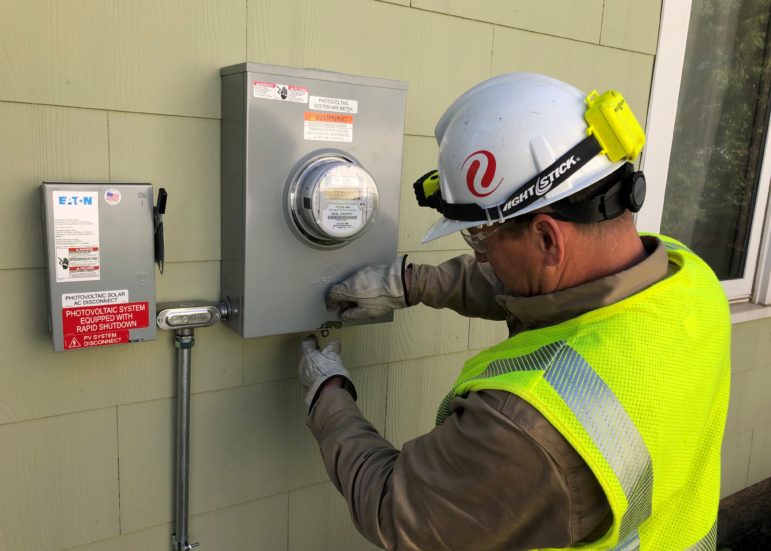Bi-partisan energy efficiency policy rises to top of clean energy bills moving at Minnesota Legislature.
Update: The Minnesota Legislature adjourned on May 18, 2020, without passing the Energy Conservation and Optimization (ECO) Act. The House passed the bill with bi-partisan support on May 11, while the Senate did not act on the bill in the final hours of the regular session. The Legislature is expected to come back over the summer to address a number of unresolved bills during a special session. Stay tuned for updates.

In a nutshell:
– The ECO Act updates and expands Minnesota’s Conservation Improvement Program.
– These updates provide more opportunities for cost-effective energy efficiency and electrification measures that support local jobs and economic development.
– ECO also raises energy savings goals and directs additional investments to low-income and under-resourced customers.
– If passed, ECO would be one of the most significant pieces of recent Minnesota energy legislation.
Tens of thousands of Minnesotans stand to benefit as lawmakers advance a clean energy bill that would boost local job creation opportunities and accelerate Minnesota’s transition to a cleaner, healthier, and more energy-efficient economy. The Energy Conservation and Optimization Act (HF4502/SF4409 or ECO) would unleash the next wave of energy efficiency investments from electric and natural gas utilities throughout the state by encouraging new programs that save additional energy and optimize customer’s energy consumption with low-cost and low-carbon energy production periods.
The ECO Act would unlock greater cost-effective energy and carbon savings.
Authored by Democratic and Republican House and Senate members and included as part of Governor Walz’s One Minnesota Path to Clean Energy, the ECO Act is supported by a broad range of stakeholders including Fresh Energy. The bill passed out of both chamber’s energy committees with bipartisan support.
In this blog post we’ll review some of the highlights featured in ECO.
Building on Minnesota’s most successful energy policy.
For over two decades, Minnesota has been a national leader in promoting energy efficiency through the Conservation Improvement Program (CIP). Minnesota’s statute 216B.241 requires electric and natural gas utilities to offer energy-saving programs that encourage customers to build and operate buildings more efficiently, as well as invest in programs that improve utility’s operational efficiencies more broadly – this is where CIP originates.
Regardless of whether you or your business has ever participated in a CIP program, all Minnesotans have benefited.
Successful programs include rebates for energy-efficient lighting, HVAC, refrigeration, and water heating technologies, and technical design assistance programs for building owners and developers. Minnesota’s most well-known energy efficiency program has saved utilities, residents, and businesses billions of dollars on unneeded energy spending, reduced millions of tons of carbon emissions, and has created tens of thousands of jobs in energy efficiency. A Minnesota Department of Commerce study found that CIP generates at least four dollars in benefits for every dollar invested into the program. Regardless of whether you have ever participated in a CIP program, all Minnesotans have benefited through the program which has helped avoid over-building of costly utility infrastructure and reduced system-wide energy costs.

ECO offers expanded energy-saving program options for consumers.
While CIP is considered widely successful, new energy-saving opportunities — such as super-efficient electric air source heat pumps replacing fossil fuel heating systems — are here that promise even greater energy and carbon savings for utilities and customers. These technologies are increasingly cost-effective and low-carbon as technologies mature and the carbon-intensity of the electric grid falls.
However, existing CIP rules limit utilities’ opportunities for capturing these cross-fuel energy savings by prohibiting what’s called “fuel-switching” (i.e. an electric utility cannot offer rebates for, or claim energy savings from, a natural gas energy efficiency improvement). Allowing cost-effective, carbon and energy-saving fuel-switching, along with updating and modernizing language that encourages programs that shift energy consumption to less costly or low-carbon times (known as load management or energy optimization), are key features of ECO.
The ECO framework will ensure that Minnesota is able to continue innovating on energy efficiency program design.
In practice, this new framework will enable customers to receive rebates or incentives from their utilities to switch to all-electric technologies. It will also allow businesses to heat and cool their buildings to coincide with low-cost renewable energy generation, continue to grow local energy efficiency jobs, and ensure that Minnesota is able to continue striving towards meeting its climate and clean energy goals.
Larger energy savings goals.
In addition to advancing electrification and energy optimization opportunities, ECO raises electric investor-owned utilities annual energy savings goals, increases the state’s overall energy savings goal (which includes both utility and non-utility programs), and expands tools available for cooperative and municipal utilities.
Enabling investor-owned natural gas utilities to offer electrification programs to consumers.
ECO also unlocks new opportunities for investor-owned natural gas utilities to promote programs that encourage customers to install electric appliances. This provision supports Fresh Energy’s beneficial electrification program area, which advocates running more of our economy on clean, renewable electricity to reduce carbon emissions and limit the worst impacts from climate change.
Energy savings prioritized over spending.
Since 2007, the CIP statute has prioritized energy savings as its core metric but has kept language surrounding minimum spending requirements intact. This “belt and suspenders” approach requiring minimum spending and energy savings has resulted in utilities consistently spending many times more than required with no significant additional benefits to consumers. This provision removes the spending requirements.
ECO incentivizes gas utilities to help consumers switch to electric.
Capturing data on lifetime energy savings.
Minnesota utilities use first-year energy savings data when counting progress towards their energy savings goals. As the next generation of longer-lived measures are installed that span multiple years or even decades, beginning to track important metrics such as lifetime energy savings will help utilities, regulators and stakeholders better understand the net benefits that accrue from CIP programs.

Enabling opportunities for utilities to invest in innovative clean technology.
Investor-owned utilities would also be allowed to file plans to the Public Utilities Commission to seek authorization to invest in projects that further the development, commercialization, and deployment of innovative clean energy technologies. These technologies must produce significant environmental and economic benefits to customers and not be widely used by the energy industry. In Colorado, similar bill language has been used to pilot solar-battery projects. This provision does not pertain to CIP and is outside of CIP statute.
ECO directs more utility dollars to low-income and under-resourced customers.
Prioritizing and doubling down on low-income spending.
One of Fresh Energy’s key priorities throughout ECO stakeholder discussions has been advancing energy efficiency opportunities and programs that benefit low-income and under-resourced customers. By doubling the minimum low-income spending requirement for investor-owned utilities and expanding eligible measures, ECO will direct more utility dollars to energy efficiency programs that serve our most at need residents.

ECO is a bi-partisan policy that would be good for all Minnesotans.
Fresh Energy has collaborated over the past two years with a wide coalition of utilities, businesses, regulators, clean energy, and consumer advocacy partners to advance ECO. While the bill did not pass when it was first introduced in 2019, it appears that 2020 may be the year. If passed, ECO would be one of the most significant pieces of recent Minnesota energy legislation.
ECO will help Minnesota advance its climate goals and more equitably serve all residents.
While we recognize that more work needs to be done to ensure that Minnesota is able to meet our climate goals and equitably serve its most at need residents, the ECO Act takes a strong step forward in advancing smart energy policy design. Fresh Energy particularly appreciates the leadership from our allies at the Center for Energy and Environment in shepherding this legislation forward. In this time of uncertainty, and as many energy efficiency professionals are out of work, ECO represents one additional way that Minnesota can grow jobs, reduce energy waste, and reduce carbon in a cost-effective and reliable way.
